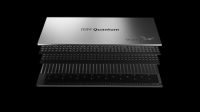IBM’s New Osprey Processor Advances Quantum Computing
November 11, 2022
IBM has achieved a new milestone in chips developed for quantum computing with the newly debuted 433-qubit Osprey chip. That’s more than three times the qubits of the 127-qubit Eagle chip IBM introduced last year. The company has its sights set on a more than 4,000-qubit system that it plans to unveil in 2025. Quantum computers solve problems faster and more accurately than classical computers and can find exact solutions to problems that today’s top computers can only guess at, known as the “quantum advantage.” Eventually, quantum computers are expected to contain millions of qubits.
Although functional quantum computers exist today and are capable of some advanced problem solving, they’re far from fully operational, yet hint at the tantalizing possibilities to come. “We’re getting closer and closer,” Dario Gil, senior vice president at IBM and director of IBM Research, told The Wall Street Journal.

Whereas classical computers use binary digits of zeros and ones, Quantum computers use quantum bits, also called qubits, which are able to represent and store information using a complex mix of zero and one.
“Machines capable of supporting this quantum state have the potential to sort through vast numbers of possibilities in nearly real time,” writes WSJ, noting, “the types of problems quantum computers could one day tackle include simulating the behavior of natural materials in chemistry, and even breaking the public-key cryptography used to secure the Internet.”
IBM was showcasing its wares at the annual Quantum Summit in New York, where it announced a partnership with Vodafone Group to explore ways of using traditional computers to defend against the quantum-enabled threats to encryption coming in the future. The company also debuted software to mitigate errors in quantum systems.
“Some of the really exciting technologies around Osprey are really not so much in the qubit chip itself is but rather what it takes to get the signals into and out of our qubits, which are based off of a superconducting technology,” Oliver Dial, chief hardware architect, IBM Quantum, told VentureBeat, adding, “We use superconducting transmon qubits and basically they store their quantum information in a microwave photon.”
IBM isn’t the only company making advances in quantum computing. Alphabet, Amazon, Microsoft and D-Wave Systems are some of the others. “As these companies take varied approaches to building quantum machines, it is possible some types of computers might end up being better-suited to solving certain problems than others,” writes WSJ, noting that “D-Wave says it has a machine of more than 5,000 qubits, known as an annealing quantum computer.”
Related:
IBM Held Talks With Biden Administration on Quantum Controls, Bloomberg, 11/9/22

No Comments Yet
You can be the first to comment!
Sorry, comments for this entry are closed at this time.